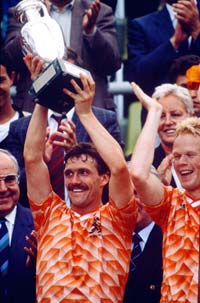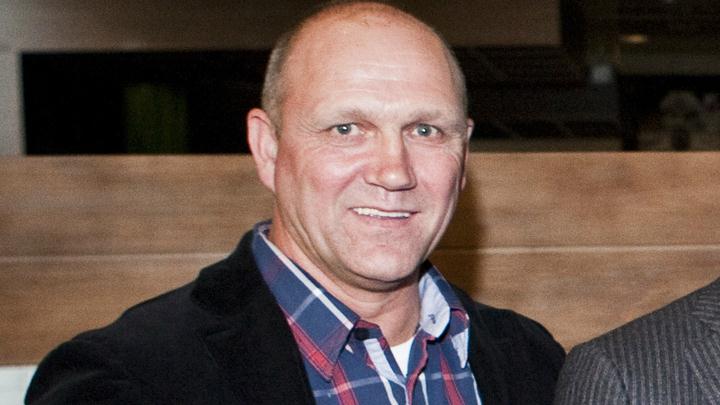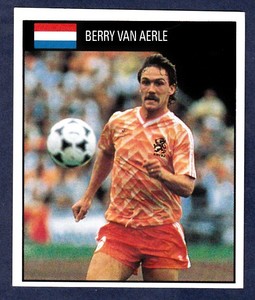The Class of ’88 will always be personified by players like Marco van Basten and Ruud Gullit. Rinus Michels made one big change after the first game ( 0-1 against the USSR) and kept his faith in his line up. A number of players in that squad were never used. Players like Wim Koevermans, Wilbert Suvrijn, Joop Hiele and Hendrie Kruzen, for instance.
Sjaak Troost, Feyenoord defender, looks back as we check what happened to the 1988 heroes.
Troost was the tall and quick defender in Johan Cruyff’s champion team of 1983 and a product of the Feyenoord youth development (like players like Mario Been, Stanley Brard and Joop Hiele).
Instead of listening to Gullit or Van Basten (again!!) we will listen to the story of a benchwarmer.
Sjaak Troost: “It was an amazing experience of course, but I wouldn’t say it was the high point of my career. I can’t really feel satisfaction as it was really tough not to play. I couldn’t have that ultimate joy, you know. When we did the canal boat ride I downed half a bottle of champagne so I suddenly did feel as if I scored that Van Basten goal in the finals, haha.”
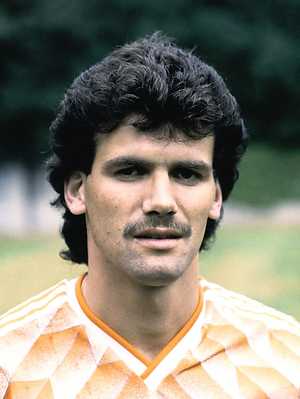
Sjaak in the 1988 jersey
In the months leading up to the tournament, Troost’s chances were good. The right full back had a super year in 1983/84 and made his debut for Oranje in 1987 against Belgium. Half a year later he played his third cap for Oranje on Wembley, against England. “That was my highpoint in Oranje. Playing on holy ground, against Gary Lineker. I played center back. Lineker did score the first goal, but I played a good game. And I remember thinking: this is the highest a player can go. I did play massive venues with Feyenoord, but Wembley…. I couldn’t believe my eyes. The entrance, those two pillars. We had butlers serving tea at half time. And that pitch… The Feyenoord groundsman would shoot you if you’d go on the grass in Rotterdam, but in Wembley it seemed as if the Royal Crown was hidden in it. It was like a carpet, truly. That evening, I played myself into the Oranje squad for the Euros. I walked off the pitch after the game and Michels gave me a pat on the back. That was the biggest compliment you could get, haha.”
Troost had a good relationship with Rinus Michels. “He would invite me at his house. Whenever I called him for a problem or a question, he would say, in that characteristic voice: “Well… I guess you will need to drop in then….”. He gave me jersey number 3. I thought I was a starter in Germany. Rijkaard had had a tough year, walking out of Ajax and moving to Zaragoza. He got number 17. But man, Rijkaard was a better player than me and he did wonderfully. What can I say?”
The 1988 starters are still very positive about the subs. The substitutes kept the starters sharp by training on the edge. But apart from that, there was no dissent. “It was a homogenous group, for sure. Including the material guy. It was just a good bunch. We were not the most skilled players, I think. We did not have players of the calibre of Koeman, Vanenburg or Gullit on the bench. There was a quality gap, other than today with all those youngsters. But I think we were the best players, because of our mentality. What was funny, was that the B-team beat the A-team most of the times at practice. But Michels would never change anything, other than that one time. And whenever the starters had played, they got to take it easy, but Michels would work the B-team like dogs. But still, there was never any complaint.”
“Adrie van Tiggelen was my roommate. A rival, for sure, but a good mate. I had one issue. I couldn’t sleep in the afternoon. Arnold Muhren and Frank Rijkaard, both great lads, could put their heads down for only ten minutes and sleep! Van Tiggelen slept whenever his feet touched the bed. Impressive. I already had my own business back then (Troost is publisher of magazine Friends in Business) and I would grab the phone, sit on the toilet and call customers, haha. It worked perfectly, as the customers all said “But…aren’t you in trainings camp with Oranje??”. And I would say “Yes, but this is so important for me” and they all said yes, hahaha.”
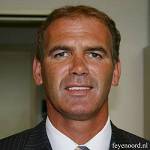
Sjaak now
Just before the finals against the USSR, the squad went to a Whitney Houston concert. Marco van Basten and I were smokers but you couldn’t in the hall. So we slipped out via some exit door before the gig and found a room backstage with fruit and ashtrays and what not. So we sat there and smoked, until the doors swung open and Whitney strolled in with her posse. The bodyguards looked savagely at us and sort of pushed us out, hahaha.”
Troost’s fourth international against Bulgaria in De Kuip before the tournament was also his last cap…. “Feyenoord allowed me to come back a bit later that summer, but I didn’t act differently. That is not something you have to try in Rotterdam, hahaha. I never really bothered too much with successes. Or failures for that matter. And I had my string of disappointments. I could write a book about that. Feyenoord had some difficult years after 1988. The football world was good to me. I enjoyed it, but I enjoy myself much more in business. I am probably more happy in that role than as a player. And more healthy too, both important things to me. I could go to Ajax after the Euro. I am sure I would have played more caps as an Ajax player. Ajax won the Europa Cup in 1991… But my Feyenoord feeling didn’t allow me to do it. I could earn twice as much, but I wouldn’t be happy. Everytime I sat as sub on the bench for Feyenoord, I read the squad selection sheet and it said “Sjaak Troost – Feyenoord”… That made me proud. I’m a Feyenoord lad. My Euro jersey is in the Feyenoord museum. That is me, I guess…”
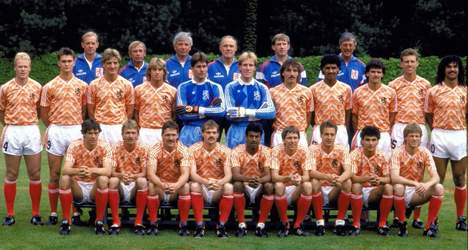
From the back: left to right.
Monne de Wit runs a physiotherapy practice and a fitness center
Gerrit Steenhuizen, material man, died in 2010.
Nol de Ruiter, assistant coach, is still scout for FC Utrecht.
Rinus Michels died in 2005 in Belgium ( 77 years old)
Bert van Lingen, assistant coach, also assisted Dick Advocaat at Oranje, Belgium and Russia. He lives in France.
Guus de Haan, physio, is retired.
Ronald Koeman is currently coach of Feyenoord (third season).
John Bosman is currently assistant coach of Jong Ajax.
Wim Kieft is football analyst on TV for Sport1.
Wilber Suvrijn lives in France and used to be antique dealer and player manager. He is currently dedicating his time to managing his daughter, a huge tennis talent.
Joop Hiele resigned as Feyenoord’s keeper academy manager and focuses on his company in NLP.
Hans van Breukelen is in the Board of Directors of PSV and does motivational workshops, public talks and workshops.
Hendrie Kruzen was assistant coach at Heracles Almelo and moves this summer to Vitesse Arnhem with Peter Bosz
Frank Rijkaard is on a sabbatical after his exit in Saudi Arabia.
Sjaak Troost has a company in Sales Promotions.
Wim Koevermans is national team manager of India
Ruud Gullit coached Chelsea, Newcastle, Young Oranje, Feyenoord, LA Galaxy and Grozny and is currently tv analist.
Marco van Basten was national team manager and is now coach of Heerenveen
Adrie van Tiggelen is coach of amateur top class team RVVH.
Berry van Aerle is scout at PSV.
Jan Wouters is head coach of FC Utrecht
Aron WInter is ambassador of his hometown Lelystad and used to be head coach of Toronto FC
Arnold Muhren was youth coach at Ajax for a long spell and currently does football clinics and presentations.
John van ‘t Schip worked with Van Basten at Oranje and Ajax and coached FC Twente, Melbourne Heart and Chicas Mexico. He is currently inbetween jobs.
Geral Vanenburg like Suvrijn manages his talented tennis daughter.
Erwin Koeman is head coach of RKC Waalwijk.
The star of the team, Marco van Basten: started the Euros as benchwarmer, after an underwhelming season in Milan (injuries). Marco became the top scorer of the tournament with 5 goals. These would end up being the only ones he’d score at a big tournament. He didn’t score in 1990 and he had a penalty opportunity against Denmark in 1992 which he missed. He did assist Bergkamp in scoring a beauty against Germany and Marco scored an onside goal which was ruled offside.
But, the former EDO, UVV and Elinkwijk amateur became the European Footballer of the Year thrice and once the World Footballer of the Year. He won the golden boot in Holland four times in a row and twice in the Serie A. He won three titles with Ajax, three National Cups and one European Cup II. He won the title in Italy three times and two European Cup Is. He also won the World Cup and the Super Cup. Due to injuries, Marco only played 58 internationals and scored 24 times.
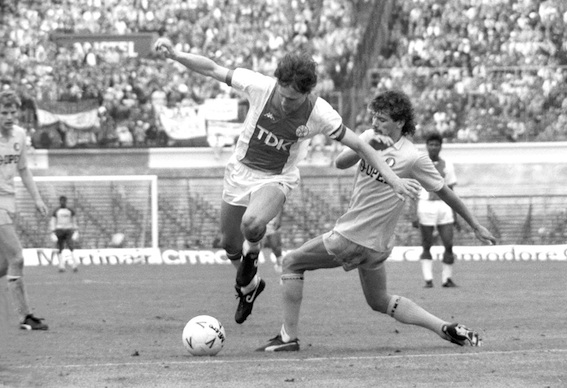 Football ballet between Van Basten and Troost, smoke partners…
Football ballet between Van Basten and Troost, smoke partners…

